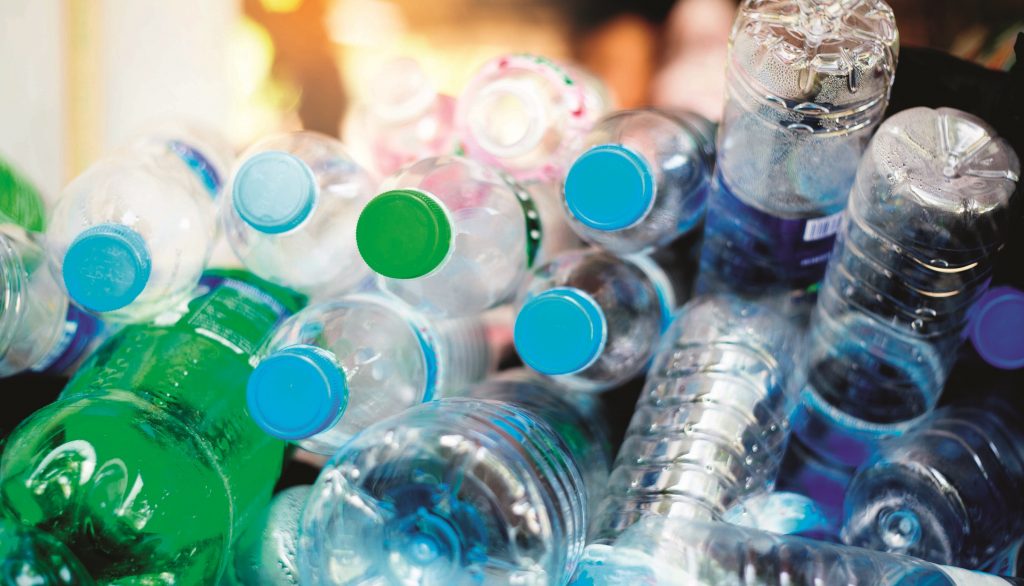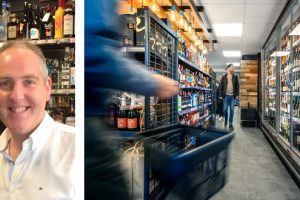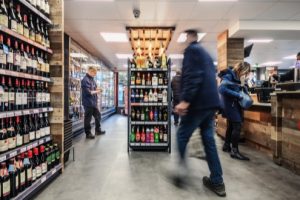So where does this leave those store owners who have been in the vanguard of the drive to a less-wasteful, environmentally-friendly sector? While some acknowledge plastic reduction strategies must be put on hold for now, they insist that, as the health crisis recedes, green concerns will again come to the fore.
Plastic reduction
Budgens retailer Andrew Thornton has pioneered plastic reduction at his store in London’s Belsize Park, but says he realised pretty quickly during the first lockdown that he would have to put his environmental ambitions on the back burner. “While we are aware that being carbon neutral is the way we need to be going, the whole hygiene thing meant we took a step backwards on plastic,” he admits. “Customers were saying: ‘I’m not buying that if there is any chance of another human having touched it’.”
He adds: “Although there is a greater awareness of the whole climate issue, people’s behaviour has changed. In six to nine months, concerns about plastic will come back with a vengeance and we really have to look at this now. We have taken a step backward before making a huge leap forward.”
By mid-March 2020, the business had put its unwrapped bread into aerated plastic packaging and items from the olive bar and food-to-go salads were merchandised in compostable containers. The store also sold 10% less loose produce, and bring-your-own container refills suffered. “Our zero packaged business was building nicely and that definitely took a hit,” says Thornton. “I’m not sure why, as it is all sealed and customers bring their own containers, which have not been touched by anybody else.”
A big reason behind refillables being set back during the pandemic has been the “alarming” misinformation around the supposed hygiene benefits of single-use plastics in response to coronavirus, says plastic-free campaign group City to Sea. The organisation, responsible for the Refill app that links grocery retailers to more than 300,000 UK consumers seeking plastic-free shopping in their locality, has been using social media to persuade people to keep their reusable coffee cups. Along with water, coffee has been the big success story in reusables. But within weeks of the first lockdown, major coffee chains set the tone by withdrawing the service, says City to Sea.
“Quite quickly, there was a knee-jerk reaction from retailers and coffee shops erring on the side of caution,” says Steve Hynd, policy manager for City to Sea, which collected a petition of 20,000 signatures to persuade coffee retailers to reverse their decision. Costa and Starbucks are among those that have returned to offering coffee to consumers who want to use their own cups, which City to Sea insists can be safer than buying coffee in disposables handled by staff. The process can be contactless if customers place their cup onto a tray and staff decant coffee into it via another cup. “We want to show how safe it is to continue to offer reusables with Covid, and that there is no need to slow down,” says Hynd.
Refillables boom
Many retailers insist refillables remain key to their strategy. Costcutter retailer Peter Patel is typical, despite sales falling by 10% on his first refill station after lockdown. He plans to introduce refills – such as nuts, dried fruits, cereals, rice, pasta and pulses – at his recently acquired store in Meopham, Kent, and add food refills to the cleaning range he already has at his Brockley, south London, outlet. “I think part of the reduction in sales on refillables has been because schools have been closed and we are not getting older students coming in and buying refill snacks like nuts that tend to be cheaper than packaged alternatives,” says Patel.
Having a sustainability strategy remains vital to “future-proofing” convenience businesses, maintains Nisa Retail’s head of format and development, Darren May. “As sustainability becomes ever more important to shoppers, we need to reflect that in our store designs, and the addition of zero-waste refill stations is just one concept Nisa partners are showing increasing interest in,” he says.
Legal moves
Changes too will be enforced by law. From April, for example, all grocery stores in England, regardless of size, will be required to charge 10p for a disposable carrier bag. Before then, only those who employed 250 staff were legally required to do so, although many environmentally responsible retailers came on board earlier. Also, an England-wide ban on single-use plastic straws and stirrers that came into effect last October is forcing many retailers to examine their offering on food-to-go.
Sustainability consultancy Bureau Veritas is urging businesses to prioritise the reduction of single-use plastics, pointing to the Co-op’s recent removal of plastic packaging on Easter eggs as a good example. “The surge in single-use plastics last year was necessary, but now the world has largely adjusted to Covid-secure measures in the supply chain, we should be looking at ways to reduce plastic waste once again,” says David Murray, technical director for sustainability.
Louise Humpington says her experience of launching a plastic-reduction grocery business, Grain & Sustain, months before the pandemic proves a sustainability strategy can work even during a public health crisis. The Scottish business – which has a 1,000sq ft outlet in Burntisland and a smaller store in Bowhouse, both in Fife – has launched community-involvement initiatives such as Take Our Waste, whereby local businesses re-use its bubblewrap and box packaging. It has introduced a ‘bring and share’ table for locals who have surplus homegrown fruit and vegetables. It also takes jar donations, which it sanitises before re-allocating to shoppers who have forgotten their own to buy from its range of more than 400 refillables, including rye, spelt, chickpea and buckwheat flour.
Popular products
To help keep the refillables Covid-secure, staff hand customers a sanitised scooper and ask everyone to disinfect their hands as they enter the store. “I would argue it is actually safer than buying packaged goods, which people pick up and put down,” Humpington says. While the aim is to be plastic-free, she says she will be flexible when it comes to popular products like feta cheese, halloumi and gnocchi. But her commitment is clear: she has even found plastic alternatives for toothbrushes and dustpan and brush sets.
Generally, the convenience sector has not led the way in the environmental revolution, says John Heagney, founder partner of the C-Store Collective. This is partly down to demographics, which will, for example, deter many from stocking a vegan range. Other factors play a part too. Deposit return schemes continue to be “an awfully slow burn” because of their cost and a lack of retail space, consumer interest and central government incentives, says Heagney. This is despite their success in markets such as Scandinavia.
However, one “massive” area where the sector has made particular progress is on food waste, he says. This has been led by two app-based systems – Gander and Too Good To Go – which he says are completely complementary. “I have added these successfully into stores that I am involved with. Gander gives consumers real-time visibility of reduced products and they can create favourite products and favourite stores to show reduced products that are available,” he says. “Alongside this, reporting is excellent. Data analysis on the overall store’s waste and the constant monitoring helps retailers focus on minimising waste.”
The next step if these products are not sold, he says, is to put them into Too Good To Go “Magic Bags” – a selection of assorted short-coded products that consumers can reserve and collect at the end of the day, paid for through the app at a third of the full retail price. “This is sustainability really working well,” Heagney says.
Bottom line
Since the start of the pandemic there has been a huge growth in demand from charities and community groups to redistribute much more surplus food, says the IGD think-tank. It has been working with the government’s first food waste and surplus champion, Ben Elliot, appointed to motivate businesses to tackle food waste from farm to fork. Covid notwithstanding, a robust sustainability strategy is good not just for the planet but for the bottom line, insists Humpington. “We have been able to set up a second shop within our first year and now employ five staff,” she says. “That is all a result of being financially successful with an ethical and sustainable business.”
By Juliet Morrison
 Talking Retail Grocery and product news for independent retailers
Talking Retail Grocery and product news for independent retailers






